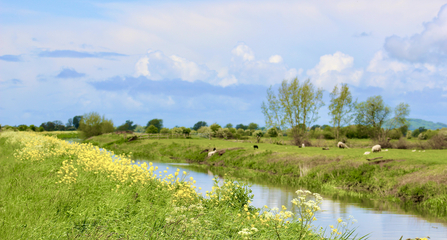Somerset Wildlife Trust is pleased to launch its Honeygar Appeal, to raise £100,000 to support turning a former intensively managed dairy farm on the Somerset Levels into something amazing for wildlife, people and climate through wilding the land.
The 81-hectare Honeygar site is located at the heart of the Avalon Marshes, within the internationally acclaimed wetlands of Somerset Levels and Moors. When wilded, Honeygar will not only better connect the nature-rich sites around it, including the Trust’s Westhay Moor and Catcott nature reserves, but it will also extend that connection to the wider landscapes beyond, acting as ecological boost to strengthen Somerset’s nature recovery network that will allow precious wildlife to spread.
Right now, the Trust now has an amazing opportunity to match fund a £100,000 gift given by a very generous philanthropist, so every donation made now will be doubled, and it is appealing to the public to give generously. Thanks to philanthropists and grant givers, the Trust has already raised £2.1m of the £3.4m it needs for Honeygar and this appeal is an important step in achieving its fundraising target.
Georgia Stokes, CEO, Somerset Wildlife Trust says, “To reverse wildlife decline and address the climate emergency we need 30% of land in the UK managed positively for nature by 2030, and our natural places connected up to help wildlife spread. We also know that protecting peat soils is critical if we are to achieve the county’s carbon and climate targets. Honeygar represents the most incredible opportunity to do both and is one of the most pioneering projects in the Trust’s history - and it’s our first wilding project. We’re really excited about what the future holds for the site. Honeygar has already generated an amazing amount of support and positive feedback, but for it to be successful we need to raise more funds.”

